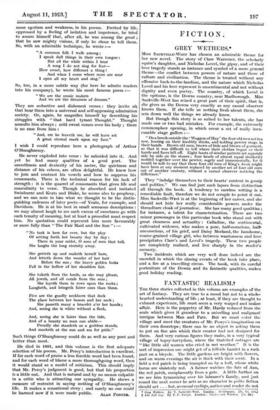FICTION:
GREY WE'rHERS.* Miss SACHVILLE-WEST has chosen an admirable theme for her new novel. The story of Clare Warrener, the scholarly squire's daughter, and Nicholas Lovel, the gipsy, and of their love tragedy stands as instance and symbol of a more general theme—the conflict between powers of nature and those of culture and civilization. The theme is treated without any offensive back-to-the-landism, and the nature which Nicholds Lovel and his love represent is unsentimental and not without dignity and even poetry. The country, of which Lovel is the epitome, is the Downs country, near Marlborough. Miss Sackville-West has seized a great part of their spirit, that is, she gives us the Downs very exactly as any casual observer knows them. If she tells us nothing fresh about them, she sets down well the things we already know.
But though this story is so suited to her talents, she has made one or two bad mistakes. For example, the extremely commonplace opening, in which occur a set of really inex- cusable stage gaffers :—
" On a bench outside the' Waggon of Hay' the four old men sat in a row, leaning on their knobbly sticks, and holding pewter mugs in their hands. Brown old men, brown of hide and brown of garment, so that it was difficult to tell where their clothes began or their hands and faces left off. Eight boots of similar pattern set squarely side by side on the stones ; four heads of almost equal similarity nodded together over the pewter, sagely and immemorially, for it would be safe to say that those four old men of King's Avon might have been at any moment replaced by another set of four old men out of another century, without a casual observer noticing the difference."
They "indulge themselves to their hearts' content in gossip and politics." We can find just such lapses from distinction all through the book. A tendency to careless writing is a remediable fault, therefore we do not scruple to point it out. Miss Sackvillc-West is at the beginning of her career, and she should not hide her really considerable powers under the threadbare cloak of journalese. She has many good qualities ; for instance, a talent for characterization. There are two minor personages in this particular book who stand out with great clearness and actuality : Calladine, the sentimental, cultivated widower, who makes a pose, half-conscious, halt- unconscious, of his grief, and Daisy Morland, the handsome, coarse-grained village girl, who between wantonness and love precipitates Clare's and Lovel's tragedy. These two people arc completely realized, and live sharply in the reader's memory.
Two incidents which are very well done indeed are the snowfall in which the closing events of the book take place, and a fire at a travelling circus. The book, with its careful portraiture of the Downs and its fantastic qualities, makes good holiday reading.


































 Previous page
Previous page